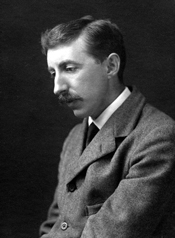E.M. Forster’s
ALEXANDRIA: A History and Guide
The Author
 One of the foremost British writers of the 20th century, E. M. Forster (1879-1970) is best known for his novels examining class differences in British society during the twilight years of Empire. The colonial experience influenced his psyche, as did the encroachment of modernity and the infiltration of urban forces upon rural England. One of the foremost British writers of the 20th century, E. M. Forster (1879-1970) is best known for his novels examining class differences in British society during the twilight years of Empire. The colonial experience influenced his psyche, as did the encroachment of modernity and the infiltration of urban forces upon rural England.
His father died when he was an infant and Forster lived with his mother for much of his life. A formative epoch transpired amid his sojourn at King’s College, Cambridge with its emphasis on classicalism, the arts and liberal studies. Here Forster’s parameters, cultural and spiritual, began to expand and in Cambridge commenced the deeper formation and emancipation of his individuality. He was a member of the Apostles, a secret society that in later years sprouted into the Bloomsbury Group.
For Forster travel engendered an element of self-becoming and, of a kind, salvation—just as wanderings and the experience of Britain’s far-flung Empire influenced so many of his countrymen; T. E. Lawrence comes to mind and later, Sir Wilfred Thesiger. Forster’s immersion into colonial life was more fleeting and fringe-like than theirs, and in photographs he perhaps appears somewhat less accustomed in his turban than they in keffiyehs. Nevertheless, the parochialism of his upper-middle class English culture began to fall away. Awarenesses and curiosities hitherto dormant became insistent as provincialism’s mirrors began to crumble away. His years in Egypt engendered his travel classic ALEXANDRIA: A HISTORY AND A GUIDE.
On a tramline he met a young conductor, Mohammed el Adl; thus ensued a romance that, apparently, held gratifications for each. Forster’s connection with el Adl revealed and prefigured a predilection for seeking fulfillment beyond the confines of class; one could say that, for Forster, the affair was the realization of the Maurice/Scudder affair in Maurice.
ALEXANDRIA is the little known exotic jewel in Forster’s oeuvre.
|



 One of the foremost British writers of the 20th century, E. M. Forster (1879-1970) is best known for his novels examining class differences in British society during the twilight years of Empire. The colonial experience influenced his psyche, as did the encroachment of modernity and the infiltration of urban forces upon rural England.
One of the foremost British writers of the 20th century, E. M. Forster (1879-1970) is best known for his novels examining class differences in British society during the twilight years of Empire. The colonial experience influenced his psyche, as did the encroachment of modernity and the infiltration of urban forces upon rural England.